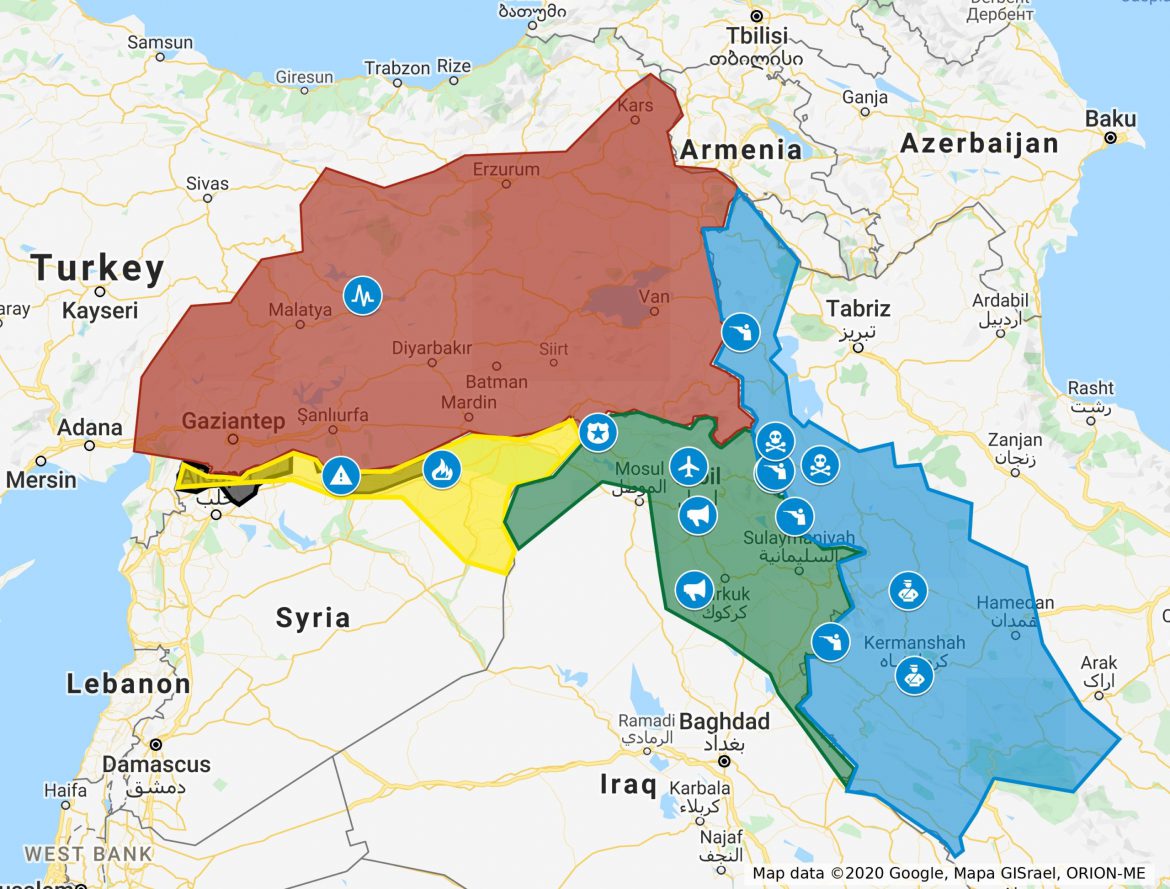2.6K
Iran
- The Iranian regime continued its campaign against Kurdish border porters (Kolbars) last week. In Selas-Babacani county of Kermanshah, Iranian security forces ambushed a vehicle and severely injured a Kolbar named Saed Mirzaee. Mirzaee was transferred to Kermanshah’s main hospital and his condition remains unknown. Additionally, Iranian border guards wounded two Kolbars near the Iraqi border town of Haji Omaran on Tuesday. The two Kolbars, both of whom are from Piranshahr, were transferred to the Choman hospital in Iraqi Kurdistan. Iranian authorities also injured two Kolbars in the vicinity of Sardasht and Salmas on Friday, and a third near Piranshahr on Sunday. Iranian authorities have now wounded a total of 15 Kolbars in 2020.
- A number of activists remain jailed following the Iranian regime’s intense crackdown in the Kurdish region to prevent further protests. In Sanandaj, three students who were previously arrested for protesting the Islamic Revolutionary Guard Corps’ shoot-down of a Ukrainian airliner were released on bail. Also, in Sanandaj, a Kurdish activist named Fareed Muradi was arrested at his home on Wednesday. Muradi had previously served three years in prison for activism. Concurrently, an Islamic Revolutionary Court sentenced a Kurd named Omed Karmi to one year in prison and 74 lashes for “cooperation with a Kurdish opposition party.” Iranian intelligence (Ettela’at) also arrested Kambis Assadi, the head of a traditional Kurdish music band (Dangi Chia), last Tuesday. Though no reason was given for Assadi’s arrest, the Iranian regime has arrested other Kurdish musicians for playing nationalist Kurdish songs. Meanwhile, the Kurdistan Human Rights Association (KMMK) reported the death of a Kurdish citizen named Hazhar Amini at the hands of the Iranian military in Oshnavieh (Shinno). The KMMK also claimed that Ettela’at had visited Amini’s home to arrest him prior to his killing.
- Poverty and unemployment continue to negatively impact society in Iranian Kurdistan, as two more Kurds committed suicide in Mehabad and Sardasht last week. Five Kurds have committed suicide since the beginning of 2020 and hundreds more have taken their own lives in recent years.
Iraq
- US President Donald Trump met with President of Kurdistan Region Nechrivan Barzani at the World Economic Forum in Davos last week. President Trump, in public remarks given before the meeting, said, “As you know, we left Syria, from the standpoint of the border, and that’s worked out great with Turkey. It’s worked out far better than anybody ever thought possible. They have the so-called “safe zone,” and I appreciate everything you’ve done to keep it as safe as possible.” President Barzani then thanked Trump for his “leadership and “support.” President Trump also met with the Kurdish President of Iraq Barham Salih.
- A number of Kurdish youths held a protest in front of the education department in Kirkuk to voice disapproval of the appointed administration’s role in what they view as an unfair teacher hiring process. Iraqi Kurds have also filed a legal complaint regarding the process. Simultaneously, Kurdish parties in Kirkuk decided to travel to Baghdad and Erbil to discuss various problems pertaining to the governing of Kirkuk Province. Kirkuk Province has experienced demographic changes and a worsening security situation since Iraqi forces and Iranian-backed militias seized control and removed Peshmerga in October 2017. The Islamic State (Da’esh) has exploited the security situation by launching an increasing number of attacks in Kirkuk Province and the rest of the “Disputed Territories.”
- Iraqi Kurdistan remains plagued by an increasing flow of illegal drugs from Iran. Kurdish security forces (Asayesh) confiscated 126 pounds of heroin at the Iraq-Turkey border crossing in Dohuk last week. The Asayesh of Sulaymaniyah Province had previously intercepted a 100-pound shipment of heroin near Haji Omran in June 2019.
- On Sunday, Turkish airstrikes hit several villages near the Akre District of Duhok Province. The airstrikes are part of a continuing Turkish military operation in Iraqi Kurdistan, dubbed Operation Claw, that is officially intended to combat Kurdistan Workers’ Party (PKK) members based in the Qandil Mountains. That said, the incursion has killed dozens of civilians and displaced thousands since it began in May 2019.
Syria
- Turkish-backed jihadists launched attacks on four villages in the vicinity of the Christian town of Tel al Tamer last week. Christian Syriac military forces affiliated with the Syrian Democratic Forces (SDF) repelled the jihadists’ advance and recovered weapons and ammunition on Friday. The recent attacks come amid increased Turkish efforts to seize additional territory and secure occupied areas. Among other things, Turkey is building walls to isolate the region and moving forward with plans to relocate Syrian refugees to Turkish-controlled zones. The Kurdish-led Autonomous Administration of North and East of Syria (AANES) denounced Ankara’s construction of walls in the area and rejected German Chancellor Angela Merkel’s support of Turkish President Recep Tayyip Erdogan’s refugee plan in Syria. “We condemn these dangerous policies pursued by Turkey, and we declare our rejection of them, and we strongly criticize the recent position of the Federal State of Germany on supporting Turkish settlement in the occupied areas,” read an AANES statement. The Kurds accuse Erdogan of seeking demographic change in Syria’s Kurdish region by replacing its displaced inhabitants with Arabs from other parts of Syria.
Turkey
- A magnitude 6.7 earthquake struck the Kurdish-majority city of Elazig on Friday, resulting in widespread destruction and numerous casualties. As of Monday, 41 people were killed and over 1500 were injured, many of whom remain hospitalized. Over 1000 homes and businesses were also damaged or destroyed. The pro-Kurdish Peoples’ Democratic Party (HDP) accused the Turkish government of preventing Kurdish organizations from delivering aid to earthquake victims in the region.

